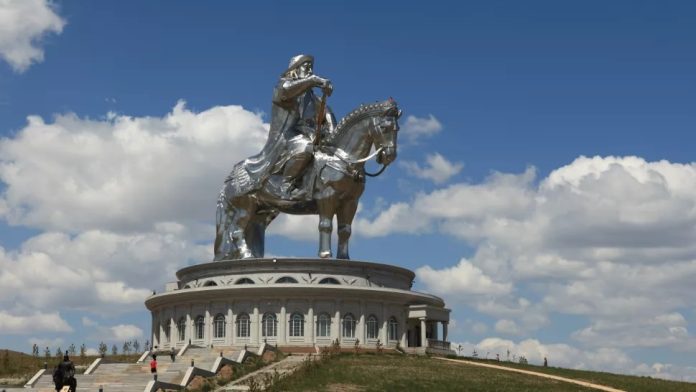Changaiz Khan combined the Mongols with him to establish the largest empire in the history of the world.
But even after he died in 1227, Changaiz Khan has been a mystery to archaeologists for 8 centuries because his tomb has not been discovered to date.
Yes indeed, Changaiz Khan’s tomb has remained a mystery for almost 800 years, despite countless attempts by adventurers, archaeologists, and thieves to find it.
This does not seem to be possible shortly, especially in Mongolia, as some quarters would like.
Most of the efforts took place in an area in northern Mongolia, Mount Burkhan Khaldun, which is also believed to be the birthplace of Changaiz Khan.
It is said that the founder of the Mongol Empire spent his last days at this place, but so far all efforts to locate his burial there have proved unsuccessful.
It is said that at the time of his death, Changaiz Khan ordered that the location of the burial be kept a secret and that the soldiers who carried the body there were killed so that no one would know the route.
It is also said that after Changaiz Khan was buried, 1,000 horses were run over the grave so that no traces would remain.
Now it has been 800 years and no one has been able to find Changaiz Khan’s tomb.
The Mysterious Death of Changaiz Khan
Not only the burial location but also the death of the founder of the Mongol Empire is mysterious. So far, it has not been determined what was the cause of Changaiz Khan’s death.
Some research reports have attributed the loss of blood from the body to death, while a 2022 study claimed that the plague caused Changaiz Khan’s death.
But beyond that, many reasons were given by the people of the era, such as one story claiming that a prince from a Chinese tribe stabbed Changaiz Khan with a dagger and bled to death the founder of the Mongol Empire. According to some, the injuries sustained from a fall from a horse proved fatal for Changaiz Khan.
Finding Changaiz Khan’s Tomb
A 2014 study found that no historical or archaeological record mentions the burial. These researchers also took the help of satellites to search for it, but they could not get any success.
An ancient Mongolian document, The Secret History of the Mongols (dated 1240), also mentions no burial, only stating that Changaiz Khan died in 1227. However, it mentions a lot about Changaiz Khan’s devotion to Burkhan Khaldun, and therefore several attempts were made there.
Historian Frank McLean claimed in his 2015 book that at the time of his death, Changaiz Khan’s army was fighting the Tanguts, a tribe in northwest China. So after Changaiz Khan died there, it was very difficult to take the body back to Mongolia because it was 311 miles away.
The Mongols did not know how to preserve the body at that time and buried Changaiz Khan somewhere in the Ordos region of China. How much truth there is in this, nothing can be clearly said about it yet.
Marco Polo, the famous traveler of the past, lived from 1254 to 1324 and spent 17 years in China. He said in the book, The Travels of Marco Polo, that 20,000 people who knew the location of Changaiz Khan’s burial were killed to keep the place a secret. But while historians doubt most of Marco Polo’s claims, his claim about Changaiz Khan’s tomb is often refuted.
One of the main reasons for the failure to find Changaiz Khan’s tomb is Mongolia itself, where the people want to keep the site a secret by the last wishes of the founder of the Mongol Empire. But at the same time, Mongolia is a very large and poor country in terms of area, where only 2% of the country has roads.
The population is sparse and there are deserts or mountains everywhere and it is easy to hide many secrets in such a land. Many quarters believe that Changaiz Khan’s tomb contains treasures collected from around the world and this is the reason for the interest of people from all over the world.
Interestingly, in 2004, a team of experts from Japan and Mongolia discovered Changaiz Khan’s palace, which contains references in historical documents that indicate that officials used to perform daily rituals from the grounds of the palace to Changaiz Khan’s tomb but it could not be discovered until now.


